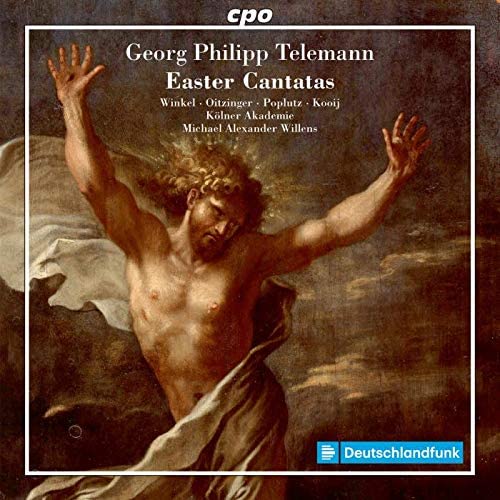Johanna Winkel, Margot Oitzinger, Georg Poplutz, Peter Kooij, Die Kölner Akademie, Michael Alexander Willens
71:40
cpo 555 425-2
Click HERE to buy this on amazon.co.uk
[These sponsored links help the site remain alive and FREE!]
This label appears to be on a mission to explore the many varied facets of this prolific baroque master’s oeuvre, and here we have a fine selection of cantatas for Eastertide from some rather lesser-known cycles, notably the Lingen II and the “Cycle without Recitative”. There is also a work from the Brussels holdings which might just be in borrowed plumage of another’s colours or a “Cuckoo’s egg” in the nest as Prof. W. Hirschmann’s booklet note puts it. Hermann Ulrich von Lingen was court secretary in Eisenach; the first cycle was conceived in Hamburg 1722/23, the second in 1728/29. The show piece here is TVWV 1:1424, Triumph! ihr Frommen freuet euch, opening with a very fine Sinfonia for trumpets and drums, moving through some really resplendent and effective movements, concluding with two splendid choruses and a chorale. The triumphant sheen of Eastertide victory is delivered with extremely accomplished playing and singing. The CD opens with much more modest forces (two violins, viola and continuo*) which provide ample contrast from sepulchral textures to befittingly lively passages as per the text: Ich war tot und siehe, ich bin lebendig! [I was dead, and behold, I am alive!] The chorales here feel a tad rushed to my ear. Now to the possible cuckoo, Er ist auferstanden TVWV1:460. While it has some quite nice features, it is not as finely woven; it feels rather terse in expression and ends abruptly with the chorale, Nun danket alle Gott. The two remaining works fall comfortably back into home territory with some highly expressive writing for the strings. Brannte nicht unser Herz in uns TVWV1:131 (from the “Cycle without Recitative”) cuts along with some exceptional movements: the soprano aria “Ach wie selig” is a dazzling display of Johanna Winkel’s talent. The other soloists deliver cogent and most deft performances, notably Georg Poplutz, whose diction is amazing (just listen to track 30). Verlass doch einst, o Mensch TVWV1:1470 (from the Lingen II cycle) offers much to admire, even with modest forces.* The descriptive scope inspired by the text reveals a composer both musically and spiritually aware and able. These are tremendous explorations of lesser-known cycles outside the “Telegentzia”, and there’s plenty more where these came from. How some of these facets do truly sparkle!
David Bellinger
